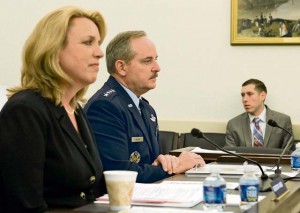WASHINGTON — Painful budget reductions will reduce the future capabilities of combatant commanders, Air Force Chief of Staff Gen. Mark A. Welsh III told Congress here March 26.

Secretary of the Air Force Deborah Lee James and Air Force Chief of Staff Gen. Mark A. Welsh III testify on the Air Force posture for fiscal year 2015 before the House Appropriations subcommittee on defense March 26 in Washington, D.C.
Testifying alongside Secretary of the Air Force Deborah Lee James at a hearing of the House Appropriations Committee’s defense subcommittee, Welsh discussed the difficult decisions budget constraints have presented and will continue to present to the Air Force’s role in defending national security.
“Every major decision reflected in this budget proposal hurts,” he said. “Each of them reduces the capabilities our combatant commanders would love to have and believe they need. Your Air Force is the finest in the world, and we need to keep it that way. We built this budget to ensure that Air Force combat power remains unequaled, but that does not mean it will remain unaffected.”
There are no more easy cuts, the general said.
“We simply can’t ignore the fact that the law is currently written (to return) us to sequestered funding levels in (fiscal year 2016),” Welsh said. “So that’s also considered as part of our plan. To prepare for that, we must cut people and force structure now to create a balanced Air Force that we can afford to train and operate in (fiscal 2016) and beyond.”
Because the Air Force needed to cut billions rather than millions of dollars out of its budget, “the normal trimming around the edges just wasn’t going to get it done,” Welsh said.
“So we looked at cutting fleets of aircraft as a way to get to the significant savings that are required,” he added.
Welsh explained the logic of the “very tough decisions” that had to be made.
“In our air superiority mission area, we already have reductions in our proposal,” he said. “But eliminating an entire fleet would leave us unable to provide air superiority for an entire theater of operations. We are the only service that can do so.”
Intelligence, surveillance and reconnaissance constitute the No. 1 shortfall of the combatant commanders year after year, Welsh noted. “They would never support even more cuts than we already have in our budget proposal,” he said.
Noting the Air Force has “several aircraft” in the global mobility mission area, Welsh said he spoke with Army Chief of Staff Gen. Ray Odierno during budget planning to get his thoughts on reducing the airlift fleet.
“His view was that a smaller Army would need to be more responsive and able to move quicker,” Welsh said. “He did not think that reducing airlift assets further was a good idea, and the (Air Force) secretary and I agree. We looked at our air refueling fleets and considered divesting the KC-10 as an option. Just one example, but the analysis showed us that the mission impact was too significant.”
(For the full story, visit www.ramstein.af.mil.)


